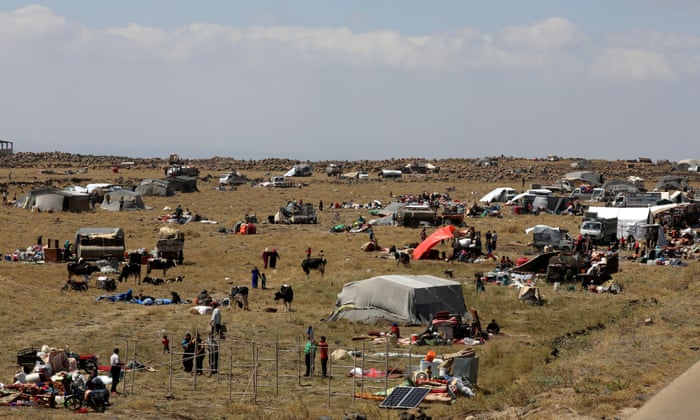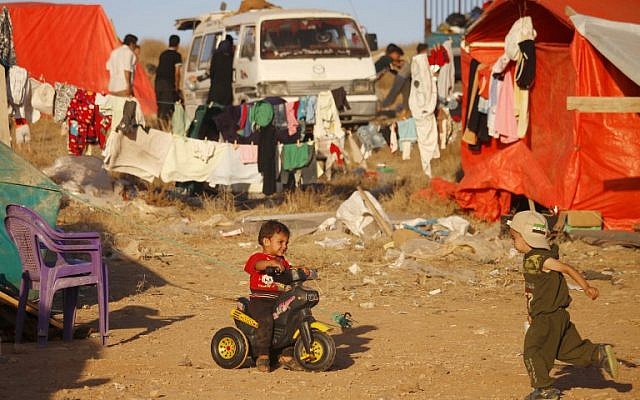Bashar al-Assad Triumphant
"It's over, we're finished."
"We have no friends any more. This is where it all ends. We're cornered and the entire country has been handed over [to the Syrian regime].
"We can't do anything anymore despite having weapons; the rebel leaders took the pay cheque."
"I am a special case because I am a child of the revolution. I am sure the Russians will hand me over to the regime."
"My fate is unknown now, I don't know what to do. I need to leave Syria because they [the Syrian military] won't leave me alive."
Mouawiya Syasneh, rebel fighter, Daraa, Syria
 |
| The Syrian national flag rises in the midst of damaged buildings in Daraa-al-Balad, an opposition-held part of the southern city of Dara on July 12. (Mohamad Abazeed/AFP/Getty Images) |
Now an adult, Mouawiya Syasneh was a teen before Syria's civil war roared into action taking the attention of the world through the ferociously barbaric steps taken by Syrian President Bashar al-Assad to destroy the intention of the "terrorists" who were in fact, Sunni Syrian civilians, the majority population in Syria, protesting that the government failed their needs, treating them with gross inequality in comparison to the minority Alawite Shiites but who comprised the government.
The city of Daraa, where Syasneh was born and raised and went to school, was rebellion central in 2011, when he and some of his teen-age friends expressed their resistance to a government that failed to respect its entire population's needs in a clear sectarian division of the haves and the have-nots. Those boys defiantly sprayed a graffiti message on the walls of their school that was clearly anti-Assad. In Syria the eyes and ears of the government are everywhere.
It took no time before all the boys were arrested for their act of insubordination to authority and insults to the president. Incarcerated, they were tortured before finally being released, although the modus operandi of the military changed somewhat as hostilities became heightened and conflict began in earnest with rebel groups fighting a guerrilla-style war, and the regime responding with a clear human-rights offending program of annihilation of the "terrorists".
Foreign fighters from elsewhere were attracted both by the breakdown of orderly restraint and the compulsion of Sunnis to respond to Shiite aggression and the entry of seasoned Islamist fighters with links to al-Qaeda, along with the various rebel Syrian groups began to make headway in toppling the Syrian regime, even as it resorted to deadly mass assaults through chemical weapons bombs, barrel bombs and helicopter gunships firing at helpless civilians.
The conflict gradually reduced Syria's second largest city to rubble, as well as half of its capital city. Ancient heritage sites and mosques, along with hospitals and schools were targeted by the regime. But the balance of power had shifted away from the government even though Iran's al-Quds force of the Republican Guard Corps and the Shiite Lebanese terrorist group Hezbollah fought alongside regime forces. The tide turned when Russia entered and began aerial bombing in support of Assad.
 |
| Smoke rises over buildings that were hit by Syrian government forces bombardment, in Daraa province, southern Syria, in early July. Syrian activists and state media said Thursday the rebels have agreed to surrender Daraa, the first city to revolt against President al-Bashar Assad with Arab Spring-inspired protests seven years ago. (Nabaa Media via AP) |
Now, Daraa, the city where the revolt against Assad's misrule began, is under government control. Syria has lost 400,000 of its citizens to the rebellion; Assad's response to his people's request for an even hand resulting in the deaths that mark the savagery of this civil war. Millions of Syrians have been internally displaced, and millions more - in all representing half of the entire population -- have become refugees; most settling in refugee camps in Turkey, Lebanon, Jordan and Egypt, but many struggling to reach Europe, inundating that continent with the desperation of their flight from Assad.
The Free Syrian Army, a coalition of rebel groups, had decided it had little option but to negotiate away their hold on Daraa for a promise by the regime to allow the fighters and their families to withdraw and seek haven in other parts of the country still in the hands of rebel groups. While they can be assured of amnesty, Syasneh and others like him are in most likelihood exempt from the agreement and marked for a very nasty death.
There is this that distinguishes many Arab Muslim dictators; they like Saddam Hussein and now Bashar al-Assad, have the stomach for inflicting mass murder on their fellows; it is what is being seen in Yemen through Saudi Arabia's intervention in that civil war, spurred on by the Islamic Republic of Iran inciting the Shiite Houthis to rebel against the ruling Sunnis. It is what Iraq and Iran experienced when they fought for years, each slaughtering the other's young males, including teens.
 |
| Internally displaced people from Deraa province are gathered near the Israeli-occupied Golan Heights in Quneitra, Syria. Photograph: Alaa Al-Faqir/Reuters |
The Daraa agreement is of a type seen elsewhere as the Syrian regime recovers its ruined geography, allowing the rebels to leave the shattered infrastructure that was once a city, and to withdraw to other areas still held by the rebels, and which government forces and their allies plan to wipe out and up one after the other until the entire territory is restored to its former status, minus millions of Syrians in a vast display of sectarian wiping-up, transforming the country to a Shiite stronghold.
An estimated 250,000 Syrian civilians flooded out of the area, displaced by the government offensive. They sit now in the misery of mass displacement around Quneitra, a province bordering Israel, and along the border with Jordan. Where they will go from there is unknown since both Israel and Jordan have closed their borders to refugees; Israel for obvious reasons and Jordan because it can manage no further intake of Syrian refugees.
For the time being they are no worse off than Syrian civilians in Idlib, the northwest Syrian province holding a million displaced Syrians in dire living conditions, exposed to airstrikes carried out by the regime which can never recognize too much material destruction much less heaps of mangled bodies. "Idlib is a crematory", Russian mediators have warned those fleeing Daraa. They should know, after all.
 |
| Displaced Syrian children from the Daraa province fleeing shelling by pro-government forces wait in a makeshift camp to cross the Jordanian border, near the town of Nasib, southern Syria, on July 1, 2018. ( AFP / Mohamad ABAZEED) |
Labels: Bashar al-Assad, Civil War, Massacres, Rebels, Syria
0 Comments:
Post a Comment
<< Home